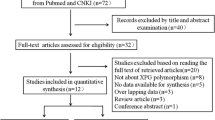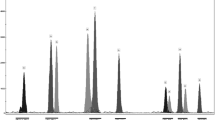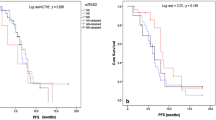Abstract
BCL-2 Associated athanogene 1 (BAG-1) and Xeroderma pigmentosum group D (XPD) are involved in the nucleotide excision repair pathway and DNA repair. We aimed to investigate whether polymorphisms in BAG-1 and XPD have effects on chemotherapy sensitivity and survival in patients with advanced non-small-cell lung cancer (NSCLC) treated with vinorelbine combined cisplatin (NP) regimen. A total of 142 patients with diagnosed advanced NSCLC were recruited in the current study. NP regimen was applied for all eligible patients. Polymerase chain reaction-restriction fragment length polymorphism (PCR-RFLP) was used for BAG-1 (codon 324) and XPD (codons 312 and 751) genotyping. The treatment response was evaluated according to the RECIST guidelines. Progression-free survival (PFS) and overall survival (OS) were record as median and end point, respectively. As for BAG-1 codon 324, the chemotherapy sensitivity in NSCLC patients with CT genotype was 0.383 times of those with CC genotype (P < 0.05). With respect to XPD codon 751, the chemotherapy sensitivity in NSCLC patients with Lys/Gln genotype was 0.400 times of those with Lys/Lys genotype (P < 0.05). In addition, NSCLC patients carrying combined C/C genotype at codon 324 in BAG-1, Asp/Asp of XPD codon 312, and Lys/Lys of XPD codon 751 produced a higher efficacy of NP chemotherapy compared to those carrying mutation genotypes (all P < 0.05). Further, there were significant differences in PFS between patients with combined C/C genotype of BAG-1 codon 324, Lys/Lys genotype of XPD codon 751, and Asp/Asp genotype of XPD codon 312 and patients carrying BAG-1 codon 324 C/T genotype, XPD codon751 Lys/Gln genotype, and XPD codon312 Asp/Asn genotype (P < 0.05). Multivariate Cox regression analysis indicated that the combined wild-type of codon 324 XPD, codon 751 XPD, and codon 312 BAG-1 is the protective factor for OS and PFS, and clinical stages is the risk factor for OS and PFS. In conclusion, our research demonstrated the combined effects of BAG-1 and XPD polymorphisms on chemotherapy sensitivity and survival in patients with advanced NSCLC, which might be the important predictive markers for platinum-based chemotherapy efficacy.





Similar content being viewed by others
References
Xie KJ, He HE, Sun AJ, Liu XB, Sun LP, Dong XJ. Expression of ERCC1, MSH2 and PARP1 in non-small cell lung cancer and prognostic value in patients treated with platinum-based chemotherapy. Asian Pac J Cancer Prev. 2014;15(6):2591–6.
Cortes R, Tarrado-Castellarnau M, Talancon D, Lopez C, Link W, Ruiz D, et al. A novel cyclometallated Pt(II)-ferrocene complex induces nuclear FOXO3a localization and apoptosis and synergizes with cisplatin to inhibit lung cancer cell proliferation. Metallomics. 2014;6(3):622–33.
Lima A, Seabra V, Martins S, Coelho A, Araujo A, Medeiros R. Thymidylate synthase polymorphisms are associated to therapeutic outcome of advanced non-small cell lung cancer patients treated with platinum-based chemotherapy. Mol Biol Rep. 2014;41(5):3349–57.
Zhou Y, Pan DS, Shan S, Zhu JZ, Zhang K, Yue XP, et al. Non-toxic dose chidamide synergistically enhances platinum-induced DNA damage responses and apoptosis in non-small-cell lung cancer cells. Biomed Pharmacother. 2014;68(4):483–91.
Reinmuth N, Meyer A, Hartwigsen D, Schaeper C, Huebner G, Skock-Lober R, et al. Randomized, double-blind phase II study to compare nitroglycerin plus oral vinorelbine plus cisplatin with oral vinorelbine plus cisplatin alone in patients with stage IIIb/IV non-small cell lung cancer (NSCLC). Lung Cancer. 2014;83(3):363–8.
Chang WJ, Sun JM, Lee JY, Ahn JS, Ahn MJ, Park K. A retrospective comparison of adjuvant chemotherapeutic regimens for non-small cell lung cancer (NSCLC): paclitaxel plus carboplatin versus vinorelbine plus cisplatin. Lung Cancer. 2014;84(1):51–5.
Bennouna J, Havel L, Krzakowski M, Kollmeier J, Gervais R, Dansin E, et al. Oral vinorelbine plus cisplatin as first-line chemotherapy in nonsquamous non-small-cell lung cancer: final results of an international randomized phase II study (NAVotrial 01). Clin Lung Cancer. 2014;15(4):258–65.
Chen LK, Liang Y, Yang QY, Xu F, Zhou NN, Xu GC, et al. Triplet platinum-based combination sequential chemotherapy improves survival outcome and quality of life of advanced non-small cell lung cancer patients. Asian Pac J Cancer Prev. 2012;13(5):1863–7.
Du Y, Su T, Zhao L, Tan X, Chang W, Zhang H, et al. Associations of polymorphisms in DNA repair genes and MDR1 gene with chemotherapy response and survival of non-small cell lung cancer. PLoS One. 2014;9(6), e99843.
Wang YD, Ha MW, Cheng J, Zhang WL, Cong X, Tong CY, et al. The role of expression and polymorphism of the BAG-1 gene in response to platinum-based chemotherapeutics in NSCLC. Oncol Rep. 2012;27(4):979–86.
Liman J, Faida L, Dohm CP, Reed JC, Bahr M, Kermer P. Subcellular distribution affects BAG1 function. Brain Res. 2008;1198:21–6.
Takayama S, Sato T, Krajewski S, Kochel K, Irie S, Millan JA, et al. Cloning and functional analysis of BAG-1: a novel Bcl-2-binding protein with anti-cell death activity. Cell. 1995;80(2):279–84.
Leng XF, Chen MW, Xian L, Dai L, Ma GY, Li MH. Combined analysis of mrna expression of ERCC1, BAG-1, BRCA1, RRM1 and TUBB3 to predict prognosis in patients with non-small cell lung cancer who received adjuvant chemotherapy. J Exp Clin Cancer Res. 2012;31:25.
Qiu M, Yang X, Hu J, Ding X, Jiang F, Yin R, et al. Predictive value of XPD polymorphisms on platinum-based chemotherapy in non-small cell lung cancer: a systematic review and meta-analysis. PLoS One. 2013;8(8), e72251.
Gandara DR, Kawaguchi T, Crowley J, Moon J, Furuse K, Kawahara M, et al. Japanese-US common-arm analysis of paclitaxel plus carboplatin in advanced non-small-cell lung cancer: a model for assessing population-related pharmacogenomics. J Clin Oncol. 2009;27(21):3540–6.
Wu W, Li H, Wang H, Zhao X, Gao Z, Qiao R, et al. Effect of polymorphisms in XPD on clinical outcomes of platinum-based chemotherapy for chinese non-small cell lung cancer patients. PLoS One. 2012;7(3), e33200.
Mathiaux J, Le Morvan V, Pulido M, Jougon J, Begueret H, Robert J. Role of DNA repair gene polymorphisms in the efficiency of platinum-based adjuvant chemotherapy for non-small cell lung cancer. Mol Diagn Ther. 2011;15(3):159–66.
Yang Y, Xian L. The association between the ERCC1/2 polymorphisms and the clinical outcomes of the platinum-based chemotherapy in non-small cell lung cancer (NSCLC): a systematic review and meta-analysis. Tumour Biol. 2014;35(4):2905–21.
Wu W, Zhang W, Qiao R, Chen D, Wang H, Wang Y, et al. Association of XPD polymorphisms with severe toxicity in non-small cell lung cancer patients in a chinese population. Clin Cancer Res. 2009;15(11):3889–95.
The Helsinki Declaration of the World Medical Association (WMA). Ethical principles of medical research involving human subjects. Pol Merkur Lekarski. 2014;36(215):298–301.
Mor V, Laliberte L, Morris JN, Wiemann M. The karnofsky performance status scale. An examination of its reliability and validity in a research setting. Cancer. 1984;53(9):2002–7.
Eisenhauer EA, Therasse P, Bogaerts J, Schwartz LH, Sargent D, Ford R, et al. New response evaluation criteria in solid tumours: revised RECIST guideline (version 1.1). Eur J Cancer. 2009;45(2):228–47.
Liu H, Liang Y, Li Y, Li Y, Wang J, Wu H, et al. Gene silencing of BAG-1 modulates apoptotic genes and sensitizes lung cancer cell lines to cisplatin-induced apoptosis. Cancer Biol Ther. 2010;9(10):832–40.
Clemo NK, Collard TJ, Southern SL, Edwards KD, Moorghen M, Packham G, et al. BAG-1 is up-regulated in colorectal tumour progression and promotes colorectal tumour cell survival through increased NF-kappaB activity. Carcinogenesis. 2008;29(4):849–57.
Zhan P, Wang Q, Wei SZ, Wang J, Qian Q, Yu LK, et al. ERCC2/XPD Lys751Gln and Asp312Asn gene polymorphism and lung cancer risk: a meta-analysis involving 22 case–control studies. J Thorac Oncol. 2010;5(9):1337–45.
Qiu LX, Yao L, Zhang J, Zhu XD, Zhao XM, Xue K, et al. XPD Lys751Gln polymorphism and breast cancer susceptibility: a meta-analysis involving 28,709 subjects. Breast Cancer Res Treat. 2010;124(1):229–35.
Avan A, Pacetti P, Reni M, Milella M, Vasile E, Mambrini A, et al. Prognostic factors in gemcitabine-cisplatin polychemotherapy regimens in pancreatic cancer: XPD-Lys751Gln polymorphism strikes back. Int J Cancer. 2013;133(4):1016–22.
Giovannetti E, Pacetti P, Reni M, Leon LG, Mambrini A, Vasile E, et al. Association between DNA-repair polymorphisms and survival in pancreatic cancer patients treated with combination chemotherapy. Pharmacogenomics. 2011;12(12):1641–52.
McCarroll SA, Kuruvilla FG, Korn JM, Cawley S, Nemesh J, Wysoker A, et al. Integrated detection and population-genetic analysis of SNPs and copy number variation. Nat Genet. 2008;40(10):1166–74.
Li J, Das K, Fu G, Li R, Wu R. The Bayesian lasso for genome-wide association studies. Bioinformatics. 2011;27(4):516–23.
Hoggart CJ, Whittaker JC, De Iorio M, Balding DJ. Simultaneous analysis of all SNPs in genome-wide and re-sequencing association studies. PLoS Genet. 2008;4(7), e1000130.
Acknowledgments
We would like to acknowledge the helpful comments on this paper received from our reviewers.
Conflicts of interest
We declare that we have no conflicts of interest.
Author information
Authors and Affiliations
Corresponding author
Additional information
Ping Li and Ya-Di Wang contributed equally to this work.
Rights and permissions
About this article
Cite this article
Li, P., Wang, YD., Cheng, J. et al. Association between polymorphisms of BAG-1 and XPD and chemotherapy sensitivity in advanced non-small-cell lung cancer patients treated with vinorelbine combined cisplatin regimen. Tumor Biol. 36, 9465–9473 (2015). https://doi.org/10.1007/s13277-015-3672-z
Received:
Accepted:
Published:
Issue Date:
DOI: https://doi.org/10.1007/s13277-015-3672-z




